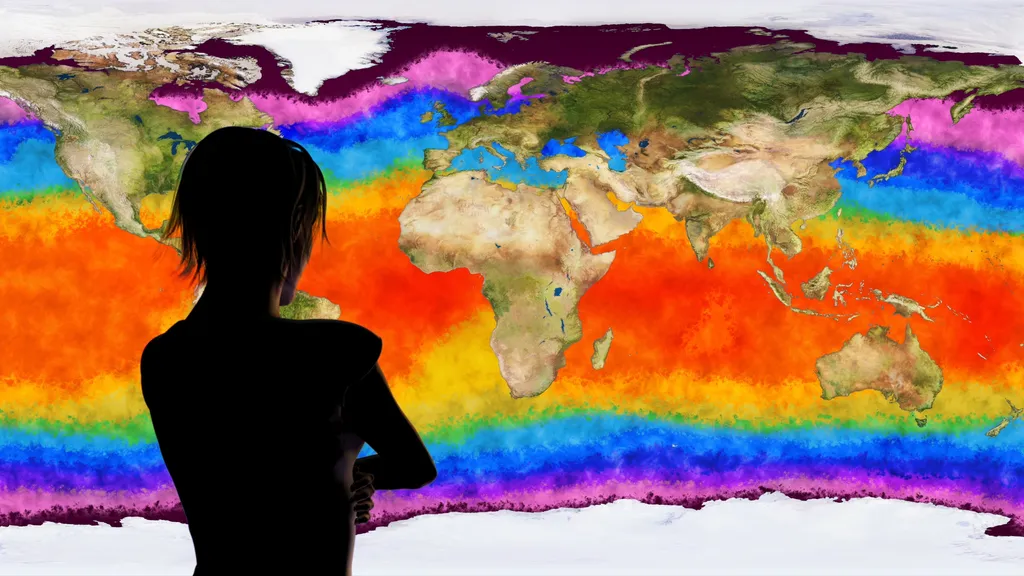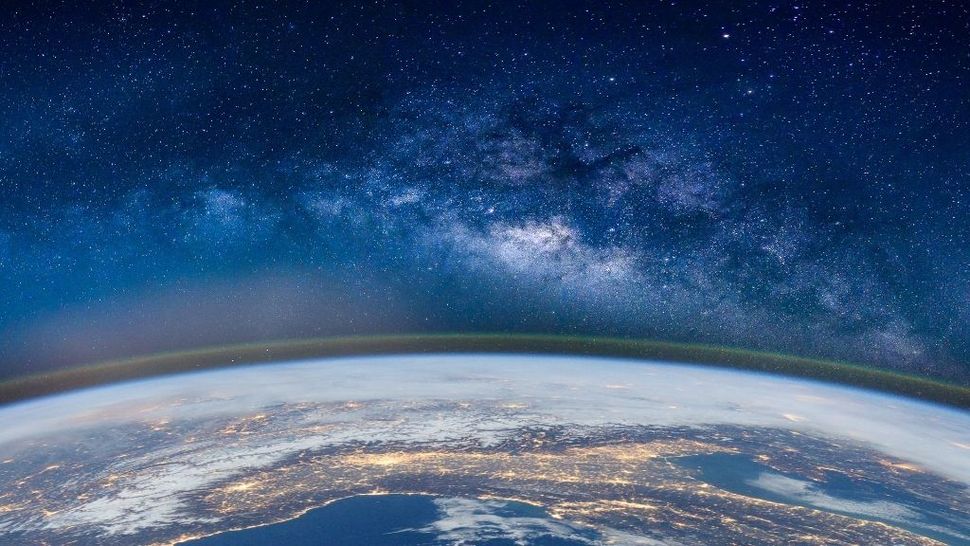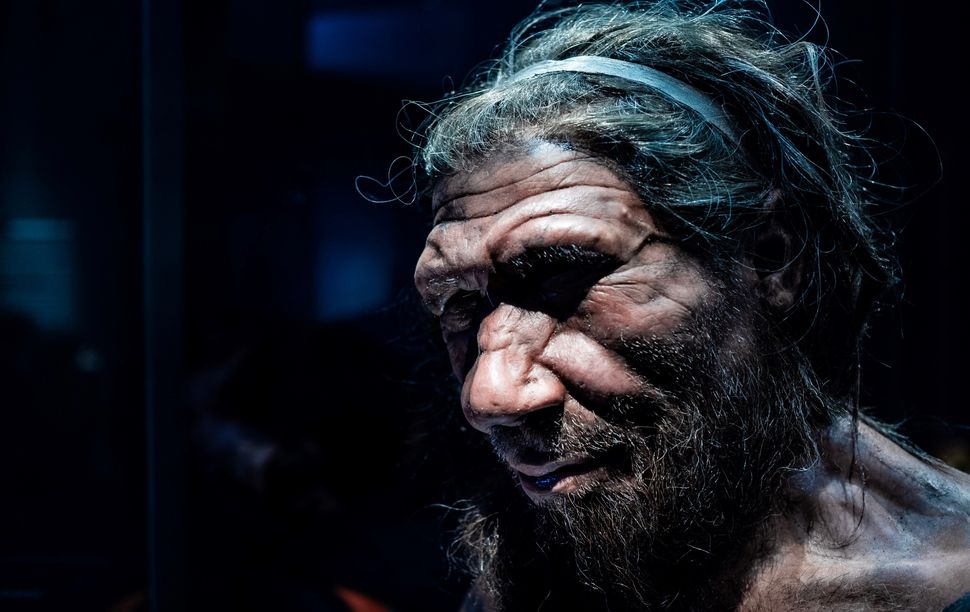기후 변화가
인간을
멸종시킬 수 있을까?
By Patrick Pester 19 days ago
19일 전 -
패트릭 페스터
There's good news and bad news.
좋은 소식과
나쁜 소식이
있다.

A digital illustration of someone watching a climate change simulation. (Image credit: boscorelli/Shutterstock.com)
기후 변화
모의실험을
보고 있는 모습의
누군가의 디지털 삽화.
(사진제공: Shutterstock.com
/보스코렐리)
The impacts of climate change are here with soaring temperatures, stronger hurricanes, intensified floods and a longer and more severe wildfire season. Scientists warn that ignoring climate change will yield "untold suffering" for humanity. But if things are going to get that much worse, could climate change make humans go extinct?
기후 변화의 영향은
치솟는 기온,
더 강한 허리케인,
더 심해진 홍수,
그리고 더 길고
더 심한 산불 계절과
더불어
여기에도 있다.
과학자들은
기후 변화를 무시하면
인류에게
"말할 수 없는 고통"을
안겨줄 것이라고 경고한다.
하지만
만약 상황이 그렇게
더 나빠진다면,
기후 변화가
인간을
멸종시킬 수 있을까?
Scientists predict a range of devastating scenarios if climate change is not kept under control, but if we just consider the direct impacts, then there's some good news; it's unlikely to cause our extinction.
과학자들은
기후변화가
통제되지 않는다면
파괴적인 시나리오의
어떤 범위를 예측하고 있다.
하지만
우리가
직접적인 영향만 고려한다면,
좋은 소식이 있다.
즉, 그것으로 인하여
우리가 멸종하지는
않을 것이다.
"There is no evidence of climate change scenarios that would render human beings extinct," Michael Mann, a distinguished professor of atmospheric science at Penn State and author of "The New Climate War: The Fight to Take Back Our Planet" (PublicAffairs, 2021), told Live Science in an email.
"인간을 멸종시킬
기후 변화 시나리오의
증거는
없습니다."
라고
펜 주립 대학의
저명한 대기 과학 교수이자
"신 기후 전쟁:
지구를 되찾기 위한 싸움"
(PublicAffairs, 2021년)의
저자인
미차엘 만은
라이브 사이언스에
이메일을 통해 말했다.
However, it's possible that climate change will still threaten the lives of hundreds of millions of people, such as by leading to food and water scarcity, which has the potential to trigger a societal collapse and set the stage for global conflict, research finds.
하지만,
기후 변화가
사회적 붕괴를
촉발하고
세계 분쟁의
발판을 마련할 수 있는
잠재력이 있는
식량과 물 부족과 같은
수억 명의 생명을
여전히 위협할
가능성이 있다는
연구 결과가 나왔다.
Related: Could we ever pull enough carbon out of the atmosphere to stop climate change?
관련항목:
우리가
기후변화를 막기 위해
대기에서
충분한 양의 탄소를
과연 뽑아낼 수 있을까?
Too hot to handle?
너무 뜨거워 감당할수 없다?
Humans are increasing the amount of greenhouse gases, such as carbon dioxide and methane, in the atmosphere through the burning of fossil fuels and other activities. These gases trap and hold heat from the sun, causing global temperatures to rise and the climate to change much faster than it otherwise would, putting humanity on a dangerous path.
인간은
화석 연료의 연소와
다른 활동들을 통해
대기중의 이산화탄소와
메탄과 같은 온실 가스의 양을
증가시키고 있다.
이 가스들은
태양으로부터 나오는
열을 가두어
지구 기온이 상승하고
기후가 다른 것보다
훨씬 더 빠르게 변화하게 하여
인류를
위험한 길로 내몰고 있다.
A runaway greenhouse effect is probably the only way climate change impacts could directly cause human extinction, according to Luke Kemp, a research associate at the Centre for the Study of Existential Risk at the University of Cambridge in the United Kingdom. This effect happens when a planet is caught in an unstoppable, positive feedback loop of warming and absorbs more heat than it loses, until the planet's oceans evaporate and it can no longer sustain life.
영국
케임브리지 대학의
실존 위험 연구 센터의
연구원 루크 켐프에 따르면,
급격한 온실 효과는,
아마도
기후 변화의 영향이
직접적으로
인간의 멸종을
야기시킬 수 있는,
유일한 방법일 것이라고 한다.
이 효과는
행성이 멈출 수 없는
수긍이가는 온난화라는
피드백 루프(고리로 이어진 반응)
에 갇혀
행성의 바다가 증발하고
더 이상 생명을 유지할 수
없을 때까지
그것이
잃는 것보다
더 많은 열을 흡수할 때 발생한다.
Fortunately, the runaway greenhouse effect is not a plausible climate change scenario on Earth. For the effect to occur, a planet needs carbon dioxide levels of a couple of thousand parts per million (Earth has a little over 400 parts per million) or a huge release of methane, and there isn't evidence for that at this time, Brian Kahn, a research scientist at NASA’s Jet Propulsion Laboratory, told NASA in 2018.
다행히도,
치솟는 온실효과는
지구에서
그럴듯한
기후변화 시나리오가
아니다.
그 효과가
일어나기 위해,
한 행성은
수백만분의
수천 개의 이산화탄소 수준이나
메탄의 대량 방출이
필요하며,
현재로서는
그것에 대한 증거가 없다고
나사 제트 추진 연구소의
브라이언 칸 연구원이
2018년 NASA에 말했다.
Venus has the runaway greenhouse effect, but it is much closer to the sun and has a much thicker, carbon dioxide-rich atmosphere that traps more heat than Earth's, Live Science previously reported. The science doesn’t support the notion of runaway warming scenarios, although climate doomists often make such claims, Mann said. "There’s no reason to exaggerate the climate threat. The truth is bad enough, and reason enough to take dramatic action."
금성은
급격한 온실 효과를 가지고 있지만,
태양에 훨씬 더 가깝고
훨씬 두껍고 이산화탄소가 풍부한
대기를 가지고 있어
지구보다
더 많은 열을 가둔다고
라이브 사이언스가 이전에 보도했다.
기후 종말론자들이
종종 그런 주장을 하지만,
과학은 급격한
온난화 시나리오의 개념을
지지하지 않는다고 맨은 말했다.
"기후 위협을 과장할
이유는 없습니다.
진실은 충분히 나쁘고,
이성은
극적인 행동을 취할 수
있습니다."

A fish-eye lens photo of Earth from space. (Image credit: Getty / Nuttawut Uttamaharad / EyeEm)
우주에서 본
지구라는 물고기 눈의
수정체 사진.
(사진 제공:
Getty /
Nuttawut Uttamaharad /
EyeEm)
According to Mann, a global temperature increase of 5.4 degrees Fahrenheit (3 degrees Celsius) or more could lead to a collapse of our societal infrastructure and massive unrest and conflict, which, in turn, could lead to a future that resembles some Hollywood dystopian films.
맨에 따르면,
지구 기온이
화씨 5.4도(섭씨 3도)
이상 상승하면
우리의 사회 기반 시설이
붕괴되고
엄청난 불안과 갈등이
야기될 수 있으며,
이는 다시 할리우드
디스토피아 영화들과
유사한 미래를 초래할 수 있다.
One way climate change could trigger a societal collapse is by creating food insecurity. Warming the planet has a range of negative impacts on food production, including increasing the water deficit and thereby reducing food harvests, Live Science previously reported. Food production losses can increase human deaths and drive economic loss and socio-political instability, among other factors, that may trigger a breakdown of our institutions and increase the risk of a societal collapse, according to a study published Feb. 21 in the journal Climatic Change.
기후 변화가
사회적 붕괴를
촉발할 수 있는
한 가지 방법은
식량 불안을 조성하는 것이다.
지구를 따뜻하게 하는 것은
물 부족을 증가시키고
그로 인해 식량 수확을
감소시키는 것을 포함하여
식량 생산에
부정적인 영향을 미친다고
라이브 사이언스는 이전에 보도했다.
2월 21일 '기후변화'지에
발표된 한 연구에 따르면,
식량 생산 손실은
인간의 죽음을
증가시키고
경제적 손실과
사회 정치적 불안정을
초래할 수 있으며
이는 우리 기관의
붕괴를 촉발하고
사회적 붕괴의 위험을
증가시킬 수 있다고 한다.
Related: Has the Earth ever been this hot before?
관련항목:
전에 지구가
이렇게 뜨거웠던 적이
있었나요?
Past extinctions and collapses
과거의 멸종과 붕괴
Kemp studies previous civilization collapses and the risk of climate change. Extinctions and catastrophes almost always involve multiple factors, he said, but he thinks if humans were to go extinct, climate change would likely be the main culprit.
켐프는
이전 문명의 붕괴와
기후 변화의 위험을
연구한다.
그는
멸종과 재앙은
거의 항상
여러 가지 요인을
수반하지만
인간이 멸종한다면
기후 변화가
주범일 가능성이
높다고 말했다.
"If I'm to say, what do I think is the biggest contributor to the potential for human extinction going towards the future? Then climate change, no doubt," Kemp told Live Science.
"만약 제가 말해보는 데,
미래로 가는 인류 멸종의
잠재력에
가장 큰 기여자가
무엇이라고
생각하는가하면요?
기후 변화가
의심할 여지가 없습니다,"
라고 켐프는
라이브 사이언스에 말했다.
All of the major mass-extinction events in Earth's history have involved some kind of climatic change, according to Kemp. These events include cooling during the Ordovician-Silurian extinction about 440 million years ago that wiped out 85% of species, and warming during the Triassic-Jurassic extinction about 200 million years ago that killed 80% of species, Live Science previously reported. And more recently, climate change affected the fate of early human relatives.
켐프에 따르면,
지구 역사의
모든 주요 대멸종 사건들은
어떤 종류의 기후 변화와
관련이 있다.
라이브사이언스는
앞서 약 4억4천만년 전
오르도비스기-실루리아기 멸종 때
85%를 멸종시킨 냉각과
약 2억년 전
트라이아스기-쥬라기 멸종 때
80%를 멸종시킨
온난화 현상 등을 보도했다.
그리고 더 최근에,
기후 변화는
초기 인류 동족들의
운명에 영향을 미쳤다.
While Homo sapiens are obviously not extinct, "we do have a track record of other hominid species going extinct, such as Neanderthals," Kemp said. "And in each of these cases, it appears that again, climatic change plays some kind of role."
호모 사피엔스는
분명히 멸종되지 않았지만,
"우리는
네안데르탈인과 같은
다른 호민족의 종들이
멸종한 기록을
가지고 있습니다,"
라고 켐프는 말했다.
"그리고 이러한 각각의 경우에,
기후 변화가
어떤 역할을
또 하는 것으로 보입니다."
Scientists don't know why Neanderthals went extinct about 40,000 years ago, but climatic fluctuations seem to have broken their population up into smaller, fragmented groups, and severe changes in temperature affected the plants and animals they relied on for food, according to the Natural History Museum in London. Food loss, driven by climate change, may have also led to a tiny drop in Neanderthal fertility rates, contributing to their extinction, Live Science previously reported.
런던의 자연사
박물관에 따르면,
과학자들은 왜 네안데르탈인이
약 4만년 전에
멸종했는지 모르지만,
기후 변동으로 인해
개체수가 더 작고 조각난 그룹으로
쪼개진 것 같다.
그리고
기온의 심각한 변화는
그들이 식용으로 의존하는
식물과 동물들에게 영향을 미쳤다.
이전에 라이브 사이언스는
기후 변화에 의해
야기된 식량 손실로 인해
네안데르탈인의 출산율도
소폭 하락해
멸종에 기여했다고 보도했다.

A male Neanderthal replicate at the Natural History Museum, London. (Image credit: Chettaprin.P/Shutterstock.com)
런던 자연사
박물관에서
네안데르탈인
남성 복제본.
(사진 제공:
Shutterstock.com/
체타프린.P)
Climate change has also played a role in the collapse of past human civilizations. A 300-year-long drought, for example, contributed to the downfall of ancient Greece about 3,200 years ago. But Neanderthals disappearing and civilizations collapsing do not equal human extinction. After all, humans have survived climate fluctuations in the past and currently live all over the world despite the rise and fall of numerous civilizations.
기후 변화 또한
과거 인류 문명의 붕괴에
한몫을 했다.
예를 들어,
300년에 걸친 가뭄은
약 3,200년 전
고대 그리스의 몰락에
기여했다.
하지만
네안데르탈인이 사라지고
문명이 몰락하는 것은
인간의 멸종과 같지 않다.
결국, 인간은
과거의 기후 변동에서 살아남았고
수많은 문명의 흥망성쇠에도
불구하고
현재 전 세계에
살고 있다.
Homo sapiens have proven themselves to be highly adaptable and able to cope with many different climates, be they hot, cold, dry or wet. We can use resources from many different plants and animals and share those resources, along with information, to help us survive in a changing world, according to the Smithsonian’s National Museum of Natural History.
호모 사피엔스는
그들이 덥든 춥든
건조하든 습하든 간에
적응력이 뛰어나고
많은 다양한 기후에
대처할 수 있다는 것을
증명했다.
스미스소니언
국립자연사박물관에 따르면,
우리는
다양한 식물과 동물의
자원을 사용할 수 있고,
정보와 함께 그 자원들을
공유할 수 있어
변화하는 세계에서
살아남을 수 있다고
한다.
Related: How would just 2 degrees of warming change the planet?
관련항목:
단 2도의 온난화가
지구를
어떻게 변화시킬까?
Today, we live in a global, interconnected civilization, but there's reason to believe our species could survive its collapse. A study published on July 21 in the journal Sustainability identified countries most likely to survive a global societal collapse and maintain their complex way of life. Five island countries, including New Zealand and Ireland, were chosen as they could remain habitable through agriculture, thanks to their relatively cool temperatures, low weather variability and other factors that make them more resilient to climate change.
오늘날,
우리는 지구적이고
서로 연결된 문명에
살고 있다.
하지만
우리 종족이
붕괴에서 살아남을 수 있다고
믿을 만한 이유가 있다.
7월 21일
'지속가능성' 저널에 발표된
한 연구 논문은
세계적인 사회 붕괴에서 살아남아
복잡한 삶의 방식을
유지할 가능성이
가장 높은 국가들을 확인했다.
뉴질랜드와 아일랜드를 포함한
5개의 섬나라가
비교적 서늘한 기온,
낮은 기후 변화,
그리고 기후 변화에
더 탄력 있게 만드는
다른 요인들 덕분에
농업을 통해
거주할 수 있는 나라로
선정되었다.
New Zealand would be expected to hold up the best with other favorable conditions, including a low population, large amounts of good quality agricultural land and reliable, domestic energy. So, even if climate change triggers a global civilization collapse, humans will likely be able to keep going, at least in some areas.
뉴질랜드는
낮은 인구,
거대한 양의 양질의 농경지,
신뢰할 수 있는 국내 에너지 등
다른 우호적인 조건들로
최고를 유지할 것으로 예상된다.
그래서,
기후 변화가
세계 문명의 붕괴를 유발한다고 해도,
인간은 적어도 어떤 지역에서는
계속 나아갈 수 있을 것이다.
Turning on ourselves
우리 자신에게 등을 돌리는 것
The last scenario to consider is climate-driven conflict. Kemp explained that in the future, a scarcity of resources that diminish because of climate change could potentially create conditions for wars that threaten humanity. "There's reasons to be concerned that as water resources dry up and scarcity becomes worse, and the general conditions of living today become much, much worse, then suddenly, the threat of potential nuclear war becomes much higher," Kemp said.
고려해야 할
마지막 시나리오는
기후에 의한 갈등이다.
켐프는
미래에는
기후 변화 때문에
감소하는 자원의 부족이
잠재적으로
인류를 위협하는
전쟁을 위한 조건을
만들 수 있다고
설명했다.
"수자원이 고갈되고
희소성이 악화될수록,
그리고
오늘날
삶의 전반적인 조건이
훨씬, 훨씬 더 나빠질수록,
갑자기,
잠재적인 핵전쟁의 위협이
훨씬 더 높아지게 된다는 것을
우려할 이유가 있습니다,"
라고 켐프는 말했다.
Put another way, climate change impacts might not directly cause humans to go extinct, but it could lead to events that seriously endanger hundreds of millions, if not billions, of lives. A 2019 study published in the journal Science Advances found that a nuclear conflict between just India and Pakistan, with a small fraction of the world's nuclear weapons, could kill 50 million to 125 million people in those two countries alone. Nuclear war would also change the climate, such as through temperature drops as burning cities fill the atmosphere with smoke, threatening food production worldwide and potentially causing mass starvation.
다시 말해서,
기후 변화의 영향은
직접적으로
인간을 멸종시키지는
않을 수 있지만,
그것은
수십억은 아니더라도
수억 명의 생명을
심각하게 위험에 빠뜨리는
사건들로 이어질 수 있다.
사이언스 어드밴스 저널에
발표된 2019년 연구 논문은
세계 핵무기의
작은 마찰을 가진
인도와 파키스탄 사이의
핵 충돌이
두 나라에서만
5천만에서 1억 2천 5백만 명의
목숨을 앗아갈 수 있다는 것을
발견했다.
핵전쟁은 또한
불타는 도시들이
연기로 대기를 채우고,
전세계의 식량 생산을
위협하고,
잠재적으로
대량 기아를 야기시키면서
기온 하락을 통해
기후를 변화시킬 것이다.
What's next?
다음은 무엇이냐 하면?
While avoiding complete extinction doesn't sound like much of a climate change silver lining, there is reason for hope. Experts say it isn't too late to avoid the worst-case scenarios with significant cuts to greenhouse gas emissions.
완전한 멸종을
피하는 것이
기후 변화의
큰 희망처럼
들리지는 않지만,
희망의 이유는 있다.
전문가들은
온실 가스 배출을
크게 줄이는
최악의 상황을 피해도
늦지 않다고 말한다.
"It is up to us," Mann said. "If we fail to reduce carbon emissions substantially in the decade ahead, we are likely committed to a worsening of already dangerous extreme weather events, inundation of coastlines around the world due to melting ice and rising sea level, more pressure on limited resources as a growing global population competes for less food, water and space due to climate change impacts. If we act boldly now, we can avoid the worst impacts."
"그것은 우리의 몫입니다,"
라고 맨은 말했다.
"만약 우리가 앞으로 10년 동안
탄소 배출을 크게 줄이지 못한다면,
우리는
이미 위험한 극도의 날씨 이벤트,
녹는 얼음으로 인한
전세계 해안선의 침수,
해수면 상승,
증가하는 세계 인구가
식량, 물뿐만아니라,
기후변화 영향에 기인하는
더 적은 우주 공간을 맡기 위해
경쟁함에 따라
제한된 자원에 대한
더 많은 압력으로
악화될 가능성이 높습니다.
지금 과감하게 행동하면
최악의 충격은 피할 수 있습니다."
Originally published on Live Science.
라이브 사이언스에 원본으로 발간됨.

댓글 없음:
댓글 쓰기